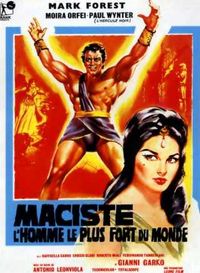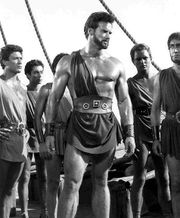 D. W. Griffith set out to depict the splendor of
ancient Babylon in Intolerance.
D. W. Griffith set out to depict the splendor of
ancient Babylon in Intolerance.
Sword and sandal films are a cinematic genre of adventure or fantasy films that have subjects set in Biblical or classical antiquity, often with contrived plots based very loosely on mythology or history. Most movies based on Greco-Roman history and mythology, or the surrounding cultures of the same era (Egyptians, Assyrians, Etruscans, Minoans), etc. are sword and sandal epic films. The greatest productions of this film genre were made during the late 1950s and early 1960s, but it has experienced a recent renaissance. Broadly considered, this could compass such diverse films as Ben-Hur, Cleopatra, Titus, or The Ten Commandments. In this sense, it is one of the oldest movie genres; the original Ben-Hur was made by Sidney Olcott in 1907; the 1914 silent film Cabiria was important in the development of the art of cinematography, and was one of the first sword-and-sandals films to make use of a massively-muscled actor, Batolomeo Pagano. Another name for the genre is peplum, from a Latin word for a sort of tunic, easy to make, and favoured by the costume departments for these films.
One critic, Roger Hillman, has argued that these images of muscular masculinity and physical prowess were used as cinematic support for the rise of Italian fascism under Benito Mussolini during the twenties and thirties. His argument is contained in a paper within a recent volume on transnational reception of peplum as a popular cinematic genre.
 This poster from a 1961 Maciste film illustrates
many people's expectations from the genre.
This poster from a 1961 Maciste film illustrates
many people's expectations from the genre.
 Steve Reeves as Hercules
Steve Reeves as Hercules
More specifically, however, the "sword and sandal" film genre usually refers to a low-budget Italian movie on a gladiatorial or mythological subject, often with a professional body-builder in the principal role; the genre occupied much of the popular segment of Italy's movie industry before the invention of the spaghetti western. Gladiators were perennial favourite subjects, as were the adventures of Hercules, Goliath, Jason and the Argonauts, or the more recent legendary strongman Maciste. The fad began with the 1958 release of Hercules, starring American bodybuilder Steve Reeves. This spawned the 1959 sequel Hercules Unchained, among literally dozens of low-budget imitations starring other bodybuilder stars such as Reg Park, Dan Vadis, and Alan Steel (AKA: Sergio Ciani).
The absurd plots, out-of-synch dialogue, wooden acting of the muscleman heroes, and primitive special effects that were often woefully inadequate to depict the legendary creatures on-screen, all conspire to give these films a certain camp appeal now. This, and the beefcake factor, made the films' unintended humour notorious in the gay community. To be sure, however, many of the films enjoyed widespread popularity among very general audiences, and had production values that were typical for popular films of the day. Several have been subjects of the Mystery Science Theater 3000 treatment. A movie series and syndicated television show called The Sons of Hercules was made from a number of different films; this ran in the 1970s.
Contents |
List of swords-and-sandals movies
 Cabiria, a
1914
silent movie, is an early classic in the
genre.
Cabiria, a
1914
silent movie, is an early classic in the
genre.
Alexander
Ben-Hur
Clash of the Titans
Cleopatra
Colossus and the Headhunters
Conan the Barbarian
Demetrius and the Gladiators
The Giant of Marathon
Gladiator
The Golden Voyage of Sinbad
Hercules
Jason and the Argonauts
Quo Vadis
The Robe
Samson and Delilah
Samson and His Mighty Challenge
Satyricon
The Seventh Voyage of Sinbad
The Silver Chalice
Sinbad and the Eye of the Tiger
Spartacus
Troy
The Ten Commandments
The Fall of the Roman Empire
Bibliography
- David Chapman: Retro Stud: Muscle Movie Posters From Around the World: Portland: Collectors Press: 2002: ISBN 1888054697
- Maggie Gunsberg "Heroic Bodies: The Cult of Masculinity in the Pepulum" in M.Gunsberg: Italian Cinema: Gender and Genre: Houndsmills: Palgrave Macmillan: 2005: ISBN 0333751159
- Irmbert Schenk "Cinema Support to National(istic) Ideology: The Italian Peplum (1910-1930)" in Natasha Gentz and Stephen Kramer (ed) Globalisation, Cultural Identities and Media Representations: Albany: State University of New York Press: 2006: ISBN 0791466841.
External links
Categories: Film genres




 216.73.216.133
216.73.216.133 User Stats:
User Stats:
 Today: 0
Today: 0 Yesterday: 0
Yesterday: 0 This Month: 0
This Month: 0 This Year: 0
This Year: 0 Total Users: 117
Total Users: 117 New Members:
New Members:
 216.73.xxx.xxx
216.73.xxx.xxx
 Server Time:
Server Time: